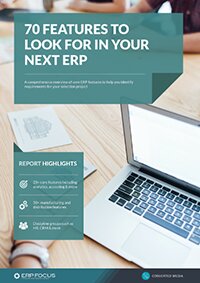Essential features to look for in an oil and gas ERP systems
While many assume that the oil and gas sectors look like ‘any other’ industrial business, when it comes to ERP operations specific elements must apply.
An ERP for oil and gas is for more than a single industry. Drilling, extracting, purifying, and distributing are all parts of oil and gas overall and each one has unique demands for the perfect ERP system. Software developers do watch out for us and we can choose from many products, some of which are specific to a single line of the business and others have flexibility built in to work with more than a single segment. There are some common needs that we should consider and the oil and gas ERP system you choose must meet your requirements.
What is ERP in oil and gas?
An oil and gas ERP system must provide support for finance, project management, manufacturing, and operations management including workforces and natural resources. Your oil and gas ERP must be able to integrate with existing systems and operations, and identify issues in supply chains before they become problems. It is important for your system to react in real-time, you don't want a delay when dealing with difficulty in the field or during the supply chain. It is also essential that your ERP system is able to handle rigid compliance needs defined by the industry and robust reporting.
Does the oil and gas industry use ERP?
ERP is a vital component of the oil and gas industry enabling end-to-end reporting on production meaning that companies can track the entire manufacturing process of oil. ERP systems are able to improve safety for the workforce through better management, as well as reducing cost and meeting compliance needs. An oil and gas ERP system provides a full overview of all operations and is able to identify bottlenecks and supply shortages before they become an issue.
Consequently, here are five key features that must apply to any ERP platform in use by oil and gas companies.
1. Local and global financial reporting
Every segment of the industry is global. Wells are in one country and refineries in another. Customers are spread across the planet too. Every location has their own tax systems built on sales revenue or quantity moved to or from the locale. Doing business of any kind means we must provide those tax and regulatory entities with the financial reports they request. Doing business also means we must work to minimize the tax burden on the enterprise. ERP for oil and gas has to manage both the local reporting required and help to balance the overall global burden.
2. Asset management
The assets required in the oil and gas business are expensive. Whether we manage an offshore drilling rig, a refinery, or a trans-national pipeline, we have billions of dollars involved. Our oil and gas ERP systems must help us keep those assets producing value continuously or help decide where they should be employed to produce greater value. Depreciation and amortization are key components of financial reporting and our ERP should work here to optimize profits.
3. Quality control
Quality control in many areas is critical in oil and gas and our ERP must help here too. While the products are extremely valuable, they are potential hazards to the environment at the same time. ERP should track any distribution losses to minimize occurrences and to aid with compliance reporting in refining and purification, those losses can be in liquid, gaseous, or solid forms and ERP has to enable the conversions. Customers have unique requirements as well and ERP should enable us to manage our processes to ensure each customer gets what they want at the optimal cost
4. Inventory management
Inventory is an important asset to be managed, always seeking an optimum level. A business needs enough oil and gas in some form to avoid missing any sale. Too much, however, is a cost to be avoided. What is unique in oil and gas is that a large component of inventory is known with little certainty. The geologists predict some quantity is under the ground and large investments are made based on those assumptions. But only later when the last drop of oil is pumped out do we know the precise quantity. Even then, we can often “find” new inventory using newly developed techniques such as fracking. Oil and gas ERP has to deal with variable inventories, unlike many other businesses.
5. Business intelligence
The unique features of oil and gas make business intelligence a special requirement. We must constantly analyze global politics to determine what the effects are on both supply and demand. We must constantly stay ahead of difficult to predict compliance requirements.
6. Real-time hard and soft asset control
Asset controls in the oil and gas sectors are critical to efficient operations. This is due to comprehensive dependencies involving integrated search R&D and operations, acquisition, development, transshipment, and refinement. Within this constellation, myriad software, hardware, and industrial components such as heavy-life vehicles, rigs, piping and more interact to define and deliver a final product. As a result of this nest of requirements, some ERP platforms are unable to deal with these elements efficiently - make sure potential vendors are up to scratch in this area.
7. Active TQM/QA processing
Constant improvement requires constant quality assurance, and this axiom plays a particular part in oil and gas sectors. In these business segments, unlike other more static commercial endeavors, R&D drives production, so ‘improvement’ is always a central operating driver due to the enormous opportunity costs associated with converting raw, fossil-based materials, into one or more final energy products. Consequently, the QA element is equally important since the products themselves require assurance validations throughout the entire supply-chain. Many vanilla ERP platforms are simply unable to maintain, so be careful to look for this particular checkpoint whenever you’re investigating a O/G platform.
8. Thin systems integrations
This value point typically applies to the speed of operations; so if you find that a particular ERP platform is difficult to integrate third-party components with a core ERP platform, you probably looking at the wrong system. Again, opportunity costs relating to oil and gas sectors are enormous, so you don’t want to find yourself being slowed down by one or more balky affiliate components. Time is money, and with oil and gas time is more critical than others.
9. Active compliance and policy management
This feature set is really where some ERP platforms perform like stars, when others don’t. The oil and gas sectors are highly regulated, with hosts of Federal, State, and Tribal rules being applied quarter-over-quarter. Over time, these clusters of regulations and policy-sets have become nests of inefficiency that tend to weigh O/G operations. Nevertheless, many exist in perpetuity and as a result, ERP platforms that can deal with more efficiency than others become critical validation points.
10. Standardized data processes
In the same way that regulations and levels of process efficiency apply to oil and gas operations, the ability to leverage standardized processes that maintain an ERP datastore becomes equally important. This is a matter of opportunity costs, on top of the costs of downstream maintenance, since standardized systems suggests better long-term stability at lower cost, where the inverse condition clearly costs more over time. In the event, the core system itself shouldn’t be the only area of investigation, however, but also the validation of any affiliate, utility, or third-party component since, once integrated, these components can either streamline or obstruct the final performance of the system.
Whatever oil and gas ERP you select, it has to work hard to keep up with the demands we will put on that system.
Free white paper

ERP Requirements template
Plan your ERP selection using our requirements template with 100 features in an editable spreadsheet. Include special requirements and extra detail in this exclusive template.

Featured white papers
Related articles
-

How to use ERP project management tools to improve efficiency
Advice on using your ERP project management tools to their full potential
-

How the right ERP can help you launch a successful omnichannel business
Petersen Zhu, CEO of DigitBridge and Vibes Base, shares how to create a scalable omnichannel stra...
-

ERP vs. HRMS: which should manage your payroll?
Compare the advantages and disadvantages of using HRMS or ERP to manage your payroll



